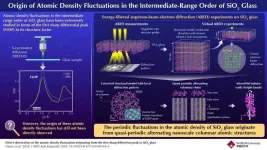(Press-News.org) Blocking a protein known as CDK7 could prevent heart damage associated with a commonly used cancer chemotherapy medication, according to a study led by scientists at Washington State University. Importantly, the researchers also found that inhibiting CDK7 could help enhance the medication’s cancer-killing capability.
Based on an animal model, the study findings could provide a foundation for future treatment strategies to reduce chemotherapy-related heart toxicity and increase treatment effectiveness. This could ultimately help increase the lifespan of people with cancer. Heart damage related to chemotherapy treatment can surface decades after treatment and can result in heart attacks, heart failure, cardiomyopathy and other types of heart disease.
Published in the journal Cardiovascular Research, the WSU study focused on doxorubicin, a chemotherapy drug used to treat breast cancer, lymphoma, leukemia and other cancers. Capable of killing a wide range of cancer cells, doxorubicin and other similar chemotherapy medications are known to be toxic to the heart. Despite this toxicity, the drug still sees a lot of use.
“Doxorubicin remains the mainstay treatment for certain cancer types for which targeted therapies or other better treatments are not available,” said senior study author Zhaokang Cheng, an associate professor in the WSU College of Pharmacy and Pharmaceutical Sciences.
Cheng has been working to unravel the underlying mechanisms of doxorubicin-induced heart toxicity to make the use of doxorubicin safer for patients who rely on the drug. This new study builds on findings from earlier research that showed that doxorubicin activates a protein known as CDK2. That protein then activates another known as FOXO1, which causes heart cells to die. Cheng’s team collaborated with WSU cancer biology researcher Boyang (Jason) Wu to take a closer look at CDK7, a protein that helps fuel cell growth and has been shown to play a role in the development of cancer.
The researchers found that CDK7 activated CDK2, which set off the chain of molecular signals that eventually led to heart cell death. They also showed that mice that lacked the CDK7 gene were protected from doxorubicin-induced heart toxicity. Next, they used a CDK7 inhibitor drug known as THZ1 to block the protein’s activity and examine the impact on heart health and cancer growth. A similar inhibitor is currently being tested as an anticancer drug in clinical trials, but its effect on the heart is still not clear.
“We are the first to study the effect of THZ1 on the heart and on tumor growth in the same model,” said study first author Jingrui Chen, a WSU research associate. “And what we found is that this CDK7 inhibitor drug can increase heart function and at the same time inhibit tumor growth.”
Though more research is needed, the researchers said their findings suggest that combining doxorubicin and THZ1 could help prevent heart damage and increase the effectiveness of chemotherapy treatment.
The researchers’ next step is to test the effect of THZ1 on heart damage and cancer growth in younger mice and follow them longer. This would more closely mimic long-term doxorubicin-induced heart toxicity seen in childhood cancer survivors. They also plan to look at other proteins that may somehow be involved in the signaling pathway that underlies doxorubicin-related heart damage.
Primary funding support for the study came from the National Heart, Lung and Blood Institute—a component of the National Institutes of Health—with additional support from the National Cancer Institute.
END
Protein discovery could help prevent cancer treatment-related heart damage
2024-06-03
ELSE PRESS RELEASES FROM THIS DATE:
Fewer than 1 in 4 patients receive dietary counseling after a heart attack
2024-06-03
Although diet is the leading contributor to premature death from heart disease in the United States, fewer than one-quarter of people who undergo major heart events receive dietary counseling in the aftermath, a study finds.
The research, led by a team from the University of Michigan Health Frankel Cardiovascular Center, tracked nearly 150,000 patients seen at hospitals across Michigan for serious heart conditions — such as heart attack and heart failure — between late 2015 and early 2020.
Results published in Journal of the Academy of Nutrition ...
Endocrine Society Guideline recommends healthy adults under the age of 75 take the recommended daily allowance of vitamin D
2024-06-03
BOSTON—Healthy adults under the age of 75 are unlikely to benefit from taking more than the daily intake of vitamin D recommended by the Institutes of Medicine (IOM) and do not require testing for vitamin D levels, according to a new Clinical Practice Guideline issued today by the Endocrine Society. For children, pregnant people, adults older than 75 years and adults with high-risk prediabetes, the guideline recommends vitamin D higher than the IOM recommended daily allowance.
Vitamin D use and ...
A dark side to dark chocolate? New study finds very minimal risk for kids from metals in chocolates
2024-06-03
Chocolate lovers may have been alarmed by a 2023 Consumer Reports finding that some dark chocolate brands could contain harmful levels of lead and cadmium.
However, a new study by Tulane University published in Food Research International has found that dark chocolate poses no adverse risk for adults and contains nutritionally beneficial levels of essential minerals.
The study sampled 155 dark and milk chocolates from various global brands sold in the United States and tested for the presence of 16 heavy metals ranging from the toxic (lead and cadmium) to the essential (copper, iron, zinc). The study then modeled the risk of eating one ounce of the chocolates per day which ...
ECOG-ACRIN completes first trial of Black patients with early-stage breast cancer
2024-06-03
Black patients with early-stage breast cancer who were treated with docetaxel chemotherapy every 3 weeks had less drug-induced peripheral neuropathy and significantly fewer dose reductions compared to those who received weekly paclitaxel, according to a trial by the ECOG-ACRIN Cancer Research Group (ECOG-ACRIN). Study EAZ171 is the first National Cancer Institute (NCI)-sponsored trial to focus specifically on enrolling a minority or underserved population to assess drug-induced toxicity (rather than drug efficacy) ...
Understanding the atomic density fluctuations in silica glass
2024-06-03
In materials science, particularly in the study of glasses, the intermediate range order (IRO) is one of the most intriguing research areas owing to its significant influence over the physical properties of glasses. The IRO refers to the structural arrangement of atoms beyond the short-range order (atomic arrangement within a few atomic distances) but shorter than the long-range order (arrangement patterns over macroscopic distances). Notably, for covalent glasses, the IRO is marked by atomic density fluctuations.
Scattering experiments provide a distinct signature of ...
Crucial shift in River Nile’s evolution during ancient Egypt discovered
2024-06-03
Crucial shift in River Nile’s evolution during ancient Egypt discovered
Researchers have explored how the River Nile evolved over the past 11,500 years and how changes in its geography could have helped shape the fortunes of ancient Egyptian civilisation.
Research published in Nature Geoscience reveals a major shift in the Nile around four thousand years ago, after which the floodplain in the Nile Valley around Luxor greatly expanded.
The findings raise the possibility that this shift could have contributed to the success of the ancient Egyptian agricultural economy at points between the Old and New Kingdom periods. ...
Study shows college students have less empathy when they are less alert
2024-06-03
DARIEN, IL – A new study to be presented at the SLEEP 2024 annual meeting found robust evidence that implicates lower alertness, a key outcome of insufficient sleep, as a predictor of muted empathic responding, which suggests alertness may support both cognitive and affective empathy.
Results show that slower response times on objective alertness tests were significantly associated with lower levels of empathic concern, and that lapses and false starts on these tests were significantly associated with poorer empathic accuracy. Additionally, those ...
Study finds that older adults with sleep apnea have higher odds of hospitalization
2024-06-03
DARIEN, IL – A new study to be presented at the SLEEP 2024 annual meeting found that sleep apnea is associated with increased odds of future utilization of health care services including hospitalization among older adults.
Results show that participants aged 50 years and older with sleep apnea had a 21% higher odds of reporting future use of any health service compared with those without sleep apnea. Specifically, individuals with sleep apnea had 21% higher odds of hospitalization after controlling for potential confounders including demographics, body mass index, health conditions, and depressive symptoms.
“Our research indicates that older adults who have sleep apnea are more ...
Most sleep tips shared on TikTok are supported by scientific evidence
2024-06-03
DARIEN, IL – A new study to be presented at the SLEEP 2024 annual meeting found that most sleep tips shared on TikTok are supported by empirical evidence.
The research findings show that of 35 unique sleep tips shared in popular videos, there was empirical support for 29. Only six sleep tips were unsupported by scientific evidence.
“These results suggest that the sleep research and sleep medicine communities have done a good job of promoting appropriate tips for sleep hygiene,” said lead author Brian T. Gillis, who has studied sleep for eight years and is an assistant professor of marriage and family therapy in the College of Human Sciences ...
Low-dose aspirin reduces inflammation caused by sleep loss
2024-06-03
DARIEN, IL – A new study to be presented at the SLEEP 2024 annual meeting found that low-dose acetylsalicylic acid, also known as aspirin, can reduce inflammatory responses to sleep restriction.
Results show that compared with placebo, preemptive administration of low-dose aspirin during sleep restriction reduced pro-inflammatory responses. Specifically, aspirin reduced interleukin-6 expression and COX-1/COX-2 double positive cells in lipopolysaccharide-stimulated monocytes, as well as C-reactive protein serum levels.
“The novelty of this study is that it investigated whether we can pharmacologically reduce the inflammatory consequences of sleep restriction,” ...

